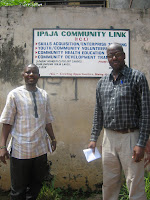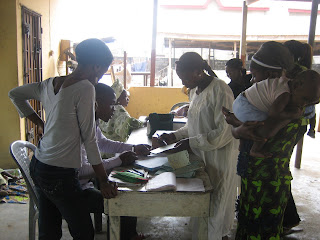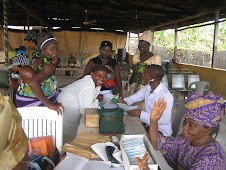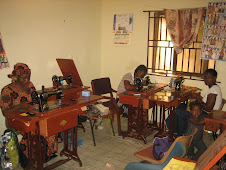 Reflections of a returnee: Yomi Oloko, Coodinator
Reflections of a returnee: Yomi Oloko, CoodinatorLast year February, I took the decision to relocate to Nigeria from the UK with a view to coordinate a small community-based organisation on the outskirts of Lagos called Ipaja Community Link. Ipaja Community Link was the main Nigeria partner of a UK-based/Nigerian-run development organisation called Development Impact For Nigeria (DIFN, see www.difn.org.uk). At the time Ipaja Community Link had very little funding, very low project development and a low staff morale. The previous coordinator had died suddenly some months back. I had actually came with the view to inform the staff team that we may have to close the project down. However, a year plus things are definitely looking brighter. But there is still much more to do and in order to do this, DIFN in the UK and Ipaja Community Link want to develop partnerships with Nigerians in the Diaspora. The motto of DIFN is "Doing Nothing Is Not An Option" and as we move towards 2015 DIFN wants to partner with Ipaja Community Link to endeavour to meet the Millennium Development Goals (MDGs). MDG 8 is Developing Global Partnerships and one partnership DIFN is keen to develop is that with the Nigeria Diaspora in the UK and other interested individuals or groups in the UK interested in Nigeria-focused development.
So, what can you do?If you'd like to
get in touch, give us a shout at info@difn.org.uk. If you'd like to
send us some funds please write a cheque to "Development Impact For Nigeria" and post to DIFN's Secretary, Ade Fashade at 84 Springfield House, 5 Tyson Street, London, E8 2LY or to pay by direct debit or bank transfer, email Ade at difn.uk@googlemail.com and he will contact you personally and provide you with the details. Or, if you are
based in Nigeria and just want to help contact me on yomi@difn.org.uk or phone me on 0702 969 8523.
 How ICL empowers the community through skills acquisition: Ojo Oluwabusola Atinuke, Enterprise and Cooperative Development Worker
How ICL empowers the community through skills acquisition: Ojo Oluwabusola Atinuke, Enterprise and Cooperative Development WorkerThe skills acquisition programme is all about mobilising, giving skills and empowering women, unemployed graduates and youth in the community with different types of skills. Presently, we are focusing on: basic sewing/dress-making, bead and bag-making and baking/snack-making. The programme started last year with 24 trainees divided into three classes. During the course of the training, we also organised an enterprise workshop which took place once a month where we taught the trainees how they could be a successful entrepreneurs and manage their own businesses. After five months of training, the first set of trainees graduated on 27 February 2009. In this great ceremony, many dignitaries were present, such as a representative from Ayobo/Ipaja Local Government, the Coordinator of Agency for the Aged, the Baale of Baruwa and a representative from UBA Bank of Nigeria. The training and the graduation ceremony has, without a doubt, impacted the lives of the trainees.
 Supporting people living with HIV/AIDs (PLWHA) and orphans and vulnerable children (OVC): Mercy Maxwell-Gii, Assistant Coordinator
Supporting people living with HIV/AIDs (PLWHA) and orphans and vulnerable children (OVC): Mercy Maxwell-Gii, Assistant CoordinatorICL sponsors a support group for persons living with and affected by HIV and a support programme for children who have lost one or both parents in death and for children whose parents are living with HIV/AIDs.
The objective of the PLWHA support group is to improve the quality of life of people living with and affected by HIV/AIDs and to help them rediscover themselves. Activities include, the provision of psychosocial support, counselling services, referal and follow-up services, drug adherence support, home-based care, training on HIV and key issues relating to HIV/AIDs and nutritional support in the form of meals and other food stuffs. Members of the support group are also encouraged to sign-up for the skills acquisition training programme. The support group holds every third Saturday of the month between 12 noon and 2pm. Presently, the support group has 12 members of which 2 are female and 2 are male.
Last Saturday, 7 March, ICL relaunched its programme for orphans and vulnerable children. The objective of the OVC support group is to reintegrate children back into the community and give them a sense of belonging. Current activities include, psychosocial support, educational support in the form of assistance with school fees, provision of school uniform, school books and enrollment of children into local public primary and secondary schools, provision of literacy training and nutritional support. Presently, the group is made up of 18 children.
ICL always needs extra financial support for these programmes. We want to reach out to as many people in the community who are vulnerable and are only able to do this if we get extra support. If you are able to donate financially, or through the donation of clothes or food items, please get in touch.
 7 is an unlucky number. Can you help Baruwa's Primary School this Red Nose Day? Jennifer Byram, VSO volunteer
7 is an unlucky number. Can you help Baruwa's Primary School this Red Nose Day? Jennifer Byram, VSO volunteerOn Friday 13 March, people in the UK gather to raise awareness and funds for people living in poverty in Africa. 11 Red Nose Days have so far raised £420 million. ICL is working in a community in Africa to give the chance for people living in poverty to change their lives. Baruwa Community Primary School has 700 pupils, 7 teachers and 7 classrooms. You can do the maths. The school has no toilet and no safe drinking water. ICL is working with teachers, parents and community leaders to raise the awareness of the challenges faced at the school and raise funds to facilitate the installation of toilets and a bore-hole.
But we need your help. Please think about donating this Red Nose Day - it's easy, if you're in the UK, just put a cheque in the post payable to DIFN and post it to Ade Fashade at 84 Springfield House, 5 Tyson Street, London, E8 2LY; or, if you're in Nigeria, call Yomi on 0702 969 8523 to arrange a transfer. Many of these children are part of the OVC support programme and ICL want to do all that we can to make their lives better.
 According to the latest national volunteering posters which Yomi and I received when we attended a VSO training course in Abuja last week, "At the heart of volunteerism are the ideals of service and solidarity and the belief that together we can make the world better." Ipaja Community Link are working to support the national volunteering programme by strenghtening opportunities for youths to engage in volunteering activities for social development in line with NEEDS (Nigeria Economic Empowerment Development Strategy for poverty alleviation) and by creating awareness and increasing the profile of volunteerism. Two staff from VSO, Kayode and Abdul, visited Ipaja Community Link at the beginning of March to meet with volunteers and staff to review our national volunteering programme in Ipaja. Our volunteers told Kayode and Abdul that they had experienced many benefits from their volunteering activities with the mother and baby clinic, the elderly, orphans and vulnerable children and with each other during the youth volunteer programme weekly meetings, such as increased self-confidence, making new friends and being involved in social activities and a sense of achieving something useful and making an impact on the community. The organisations that our volunteers spend their time with said that they had inspired staff with the spirit of service, provided extra support to fill skill gaps and improved the relationship between young people and others in the community. The national volunteering programme with VSO sees volunteers as one of the key ways to deliver its development agenda in local communities. Between April 2008 and March 2009, the VSO national volunteering programme in Nigeria placed over 2,500 volunteers throughout the country.
According to the latest national volunteering posters which Yomi and I received when we attended a VSO training course in Abuja last week, "At the heart of volunteerism are the ideals of service and solidarity and the belief that together we can make the world better." Ipaja Community Link are working to support the national volunteering programme by strenghtening opportunities for youths to engage in volunteering activities for social development in line with NEEDS (Nigeria Economic Empowerment Development Strategy for poverty alleviation) and by creating awareness and increasing the profile of volunteerism. Two staff from VSO, Kayode and Abdul, visited Ipaja Community Link at the beginning of March to meet with volunteers and staff to review our national volunteering programme in Ipaja. Our volunteers told Kayode and Abdul that they had experienced many benefits from their volunteering activities with the mother and baby clinic, the elderly, orphans and vulnerable children and with each other during the youth volunteer programme weekly meetings, such as increased self-confidence, making new friends and being involved in social activities and a sense of achieving something useful and making an impact on the community. The organisations that our volunteers spend their time with said that they had inspired staff with the spirit of service, provided extra support to fill skill gaps and improved the relationship between young people and others in the community. The national volunteering programme with VSO sees volunteers as one of the key ways to deliver its development agenda in local communities. Between April 2008 and March 2009, the VSO national volunteering programme in Nigeria placed over 2,500 volunteers throughout the country.  With the support of VSO and Ipaja Community Link's international volunteer, Jennifer, and alongside Timothy, the Youth Volunteer Coordinator, we are looking to provide volunteers with a high-quality volunteering experience that changes a person's life. There is also a network of international volunteers across Nigeria from the UK, United States and Netherlands, with 5 of these based in Lagos, and so through the sharing of experiences, contacts and learnings, we can drive forward the national volunteering programme to alleviate poverty in Nigeria. In Ipaja there is only a certain amount that 8 paid staff can do in the community, but our youth volunteers are able to reach more people through volunteering with local community organisations and meeting with, caring for and assisting others in the community. Volunteering is now seen as a must-have building block of communities and civil society.
With the support of VSO and Ipaja Community Link's international volunteer, Jennifer, and alongside Timothy, the Youth Volunteer Coordinator, we are looking to provide volunteers with a high-quality volunteering experience that changes a person's life. There is also a network of international volunteers across Nigeria from the UK, United States and Netherlands, with 5 of these based in Lagos, and so through the sharing of experiences, contacts and learnings, we can drive forward the national volunteering programme to alleviate poverty in Nigeria. In Ipaja there is only a certain amount that 8 paid staff can do in the community, but our youth volunteers are able to reach more people through volunteering with local community organisations and meeting with, caring for and assisting others in the community. Volunteering is now seen as a must-have building block of communities and civil society.









































